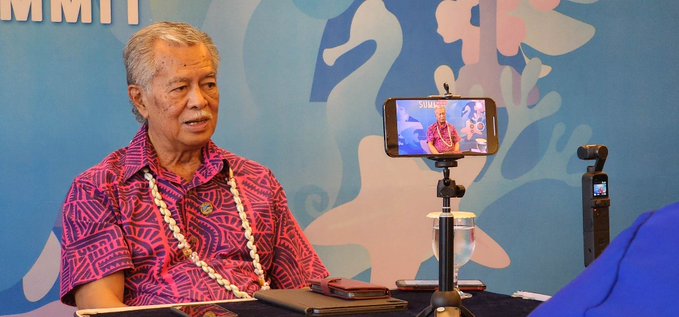Pacific Islands Forum Secretary General Henry Puna has commended the efforts of Pacific delegations progressing the global climate agenda at this month’s meeting in Bonn, Germany.
The 2023 Subsidiary Bodies meetings were attended by almost 8,000 participants including national delegations, observer organisations and media.
“Our Pacific negotiators are truly holding the line for all people of the Blue continent, and the results they achieve are often not credited back to their tireless efforts,” said SG Puna. “They wear many hats and titles in the work of technical experts, climate negotiators and activists. When the resources, time zones, and challenges facing them often feel daunting and doubtful, we must recognise and respect what they do for our benefit.”
Delegations have returned from two weeks in Bonn, Germany, where they gathered from 05 – 15 June for the Bonn Subsidiary Bodies 58th climate meetings, convened to prepare decisions for adoption at COP28 in the United Arab Emirates in December.
A Pacific Islands Forum team led by acting Climate Resilience Team Leader Karlos Lee Moresi joined other Technical advisers from SPREP, SPC and other bodies, supporting the Pacific efforts in Bonn.
Unlike previous Bonn sessions which would see the adoption of the agenda at the Opening Plenary, Parties at the SB58 were only able to adopt an agenda a day before the final day of negotiations, raising concerns over timing for any substantial work to progress. The Mitigation Work Programme (MWP) is key to determining the scale of finance required for climate action, and the 1.5-degree temperature goal remained a contentious issue for Parties. In addition to this, Pacific-SIDS once again had to fight for the recognition of science and the IPCC 6th Assessment Report in the negotiations.
Amidst these concerns negotiations progressed on priority issues for the Pacific, Moresi said.
A key priority for the Pacific is Loss and Damage with Pacific Small Islands Developing States joining the Alliance of Small Island States (AOSIS) in discussions to decide on hosting arrangements the Santiago Network (SNLD) Secretariat, a network established to catalyse technical assistance to deal with loss and damage associated with the impacts of climate change in vulnerable countries. The host for the SNLD is expected to be decided at COP28.
Other mandated events progressed as planned. Pacific climate finance technical experts and negotiators were part of the Sixth Technical Expert Dialogue on the New Collective Quantified Goal (NCQG) for Climate Finance. Pacific SIDS position is that the New Collective Goal on Finance should be needs based, recognizing national circumstances and existing systems for mobilisation.
The Oceans-Climate nexus dialogue, critical to the Pacific and holding special significance for the region was also convened. At the start of the Ocean and Climate Change Dialogue, delegates heard from the UN Special Envoy for the Ocean, Peter Thomson.
He stressed the need to include the Ocean in all climate change discussions noting its vital role in regulating climate as well as its enormous potential as a carbon sink.
Thomson also emphasised the economic and social significance of the Ocean to island communities. The Ocean climate change dialogue focused on protecting coastal ecosystems and the Ocean’s important role as a source of economic resources and food security.
The Work Programme on transition pathways was initiated with further discussions expected around the elements, activities, and modalities of the Work Programme.
At the close of SB58, there is more work ahead. Other mandated events are also expected to continue.
The first Global Stocktake, designed to assess the global response to the climate crisis, is set for COP28 and whilst a draft “work-in-progress” outline has been released since SB58 ended, there is an urgent need to have all technical assessments completed before Parties convene again in November in the United Arab Emirates.
SOURCE: PIFS/PACNEWS













